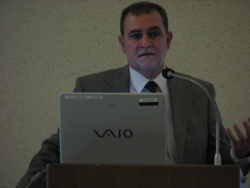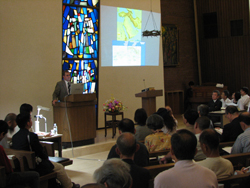Center for Interdisciplinary Study of Monotheistic Religions(CISMOR)Doshisha University
> Public Lectures > The Roots of Conflict in the Middle EastPublic Lectures
Lecture (Open for the public)
The Roots of Conflict in the Middle East
| Date: |
2006/06/17 14:00-16:00 |
|---|---|
| Place: | Chapel in the Divinity Hall, Imadegawa Campus, Doshisha Univ. |
| Lecture: | Prof. Azzam Tamimi (Director, Institute of Islamic Political Thought) |
|
Jews have long been persecuted in Russia and Europe, but it became especially intense under the Nazi regime from 1933 until the end of World War II in 1945. Zionism as a movement started in the late 19th century and promoted Jewish migration to Palestine. From 1944 to 1947, Jewish militants such as the group Irgun forced the British administrator, by diverse means including arms, to quit the Palestine Trust Territory. On May 14, 1948, the founding of Israel was declared and a Jewish state was established. At that time, 846,000 Palestinians fled from Palestine, and more became refuges after the occupation of the East Bank and Gaza districts in the third Middle Eastern War of 1967. Since then, they have been demanding a return to their fatherland. Palestinians living in areas of Israeli jurisdiction came under pressure, and in 1987 a resistance movement called 'Intifada' started. After that, the Palestine Liberation Organization, or PLO, recognized Israel and concluded Oslo Agreement with Israel in 1995. Partial autonomy was realized for the Palestine Administration in the West Bank and Gaza district. However, negotiation between the PLO and Israel were not settled and an independent state of Palestine was not established. In 2000, Ariel Sharon's belligerent visit to the Al Aqsa mosque fomented the second Intifada. Sharon was inaugurated as Prime Minister and the Palestinian-Israeli conflict raged. The 'Road Map'-a blueprint for building a Palestinian state-ran into trouble: there were intrusions into the Palestinian autonomous district and assassinations of Hamas leaders, including Shaikh Ahmad Yassin, and then, in 2002, came the murder in Jenin. In 2004 the chairman of the PLO, Yasser Arafat, passed away. Sharon's government adopted a policy of separation, constructing walls and withdrawing from the Gaza district. Palestinians are victims, not criminals. The Israeli government oppresses Palestinians. Under the circumstances, the PLO cannot be the representative of all Palestinians because of its policy of appeasement with Israel, corruption, and internal trouble. Palestinians must reclaim Jerusalem and let refugees return. In 2005, Hamas was elected as the governmental party in a general election, and became the real representative of the Palestinians instead of the PLO. Hamas proposes to Israel to exchange 1) withdrawal of Israeli occupational troops from the West Bank and Gaza District, 2) removal of illegal Jewish settlements in the West Bank and Gaza District, and 3) release of all Palestinian prisoners in Israeli jails, for hudna-truce in Arabic. The cases of Northern Ireland and South Africa can be models for such a truce. Hamas is the first representative government elected freely by Palestinians. Hamas strives for dignity, the right of return, and liberation from colonialism for the Palestinian people. Fatah is corrupt while Hamas, by contrast, is clean, transparent, and perform their service with sufficient accountability. The assertion of Hamas is based on Islam. Hamas will save the situation, and establish governance by law and equality of citizens through an independent judiciary system. Hamas also calls on Arabs and Muslims not to yield under Israeli and Western intimidation, and demands the release of 9,000 Palestinians from primarily Israeli prisons. Hamas will reestablish a security organization, which really contributes to Palestinians. Henceforth, Hamas will overcome the hard situation and realize their political objectives. Yuki Shiozaki (COE Promoted Researcher, Graduate Student, School of Theology, Doshisha University) |
|
|
Handout |
|

